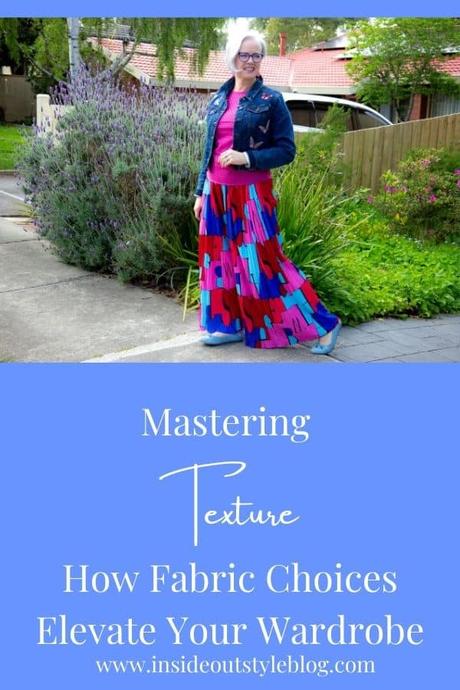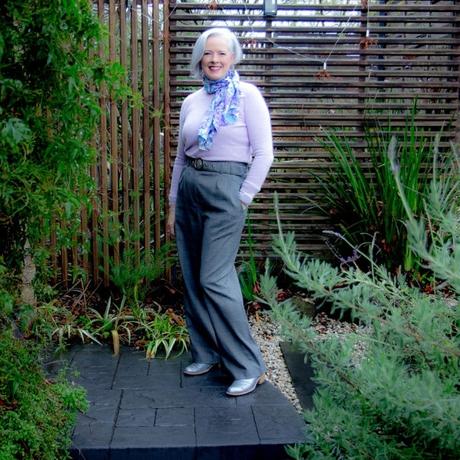When we think about building a stylish wardrobe, most of us focus on colour, fit, and shape. But there's another often-overlooked element that can truly transform an outfit-the importance of texture in fashion. The fabrics you choose are just as important as the colours or cuts, adding depth and interest to even the simplest of outfits. Whether it's the softness of silk or the ruggedness of denim, texture can take your wardrobe from basic to breathtaking.
Understanding the Importance of Texture in Fashion
Texture plays a key role in how an outfit feels and looks. It's all about adding layers of visual interest and touchable appeal to your ensemble. A monochromatic outfit can go from flat to fabulous simply by combining different fabrics. The contrast between rough and smooth, soft and structured, can create depth and make your look more dynamic.
In my 7 Steps to Style program, I encourage women to experiment with different textures because it's a great way to add sophistication and complexity without needing bold prints or patterns. Even if you're a fan of minimalist dressing, playing with fabric textures can give your outfit that extra something that makes it feel luxe and intentional.
Here are some ideas on how different fabrics can elevate your wardrobe.
Silk: The Epitome of Elegance
Silk is the ultimate fabric for adding a touch of elegance and luxury to your outfit. Its smooth, soft finish catches the light beautifully, creating a subtle sheen that instantly elevates any look. What I love about silk is its versatility-it works in both casual and formal settings. Pair a silk blouse with jeans for a chic, laid-back look or with tailored trousers for something more polished.
Because of its light and airy feel, silk can also soften the appearance of structured pieces, giving them a more feminine and fluid look. A silk scarf, for example, can add a touch of sophistication to a blazer, and a silk dress can create effortless movement, making it perfect for days when you want to feel both comfortable and glamorous.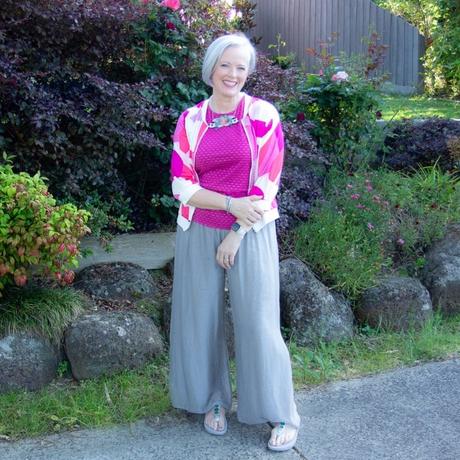
These silk pants are super comfortable and can be dressed up or down and are great for a summer's day or evening out.
Style Tip: If you're new to incorporating silk into your wardrobe, start with accessories like scarves or camisoles. These are easy ways to add a luxurious feel without committing to a full silk outfit.
Wool: Warmth with Structure
Wool is a classic fabric that adds both warmth and texture to your wardrobe. Known for its durability and structure, wool pieces are essential for colder months, but they can also be incredibly stylish year-round. Think of wool coats, tailored trousers, or knit jumpers that provide not just functionality but also a polished and sophisticated look.
The beauty of wool is its ability to hold shape, which is perfect for creating structured outfits. Wool blazers, for example, give a sleek and put-together feel, even when paired with more casual pieces like denim or cotton. Wool also comes in different weights, from lightweight merino to chunky cable knits, offering a range of textures that can add dimension to your look.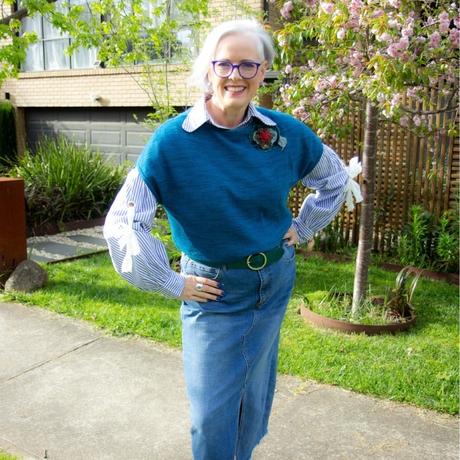
I love this sleeveless wool sweater that has a slightly textured appearance that adds some detail to my outfits (plus it's a signature colour for me - so what's not to love!)
Style Tip: Layer wool with softer fabrics like silk or cotton to create an interesting contrast between the sturdy and the soft. For example, a lightweight wool jumper over a silk blouse is a perfect combination of practicality and luxury.
Cashmere: Softly Touchable
Cashmere is the ultimate kind of wool, never scratchy and so soft and touchable. I love it for both its warmth and feel against my skin. Each winter I'm always on the lookout for some new cashmere jumpers to keep me warm and toasty.
You can dress it up or down, wear it with jeans for a relaxed look or dress it up with dress pants and silk scarf.
What's great is that it can be washed in your machine on a gentle cycle in cool water and then hung to dry.
Style Tip: Layer with a silk blouse for a chic dressy look. Remember to depill it when it starts to get those little balls to keep it looking fresh.
Denim: Effortlessly Cool
Denim is the fabric of versatility-durable, comfortable, and effortlessly stylish. There's a reason denim has remained a wardrobe staple for decades. It adds a laid-back, cool factor to any outfit, but it's also incredibly adaptable. Denim can be dressed up or down depending on how you style it.
A pair of classic jeans is a given, but don't overlook other denim pieces like jackets, skirts, or even dresses. The texture of denim contrasts beautifully with softer fabrics, making it a perfect layering piece. For example, a denim jacket worn over a flowing cotton or silk dress strikes the perfect balance between rugged and refined.
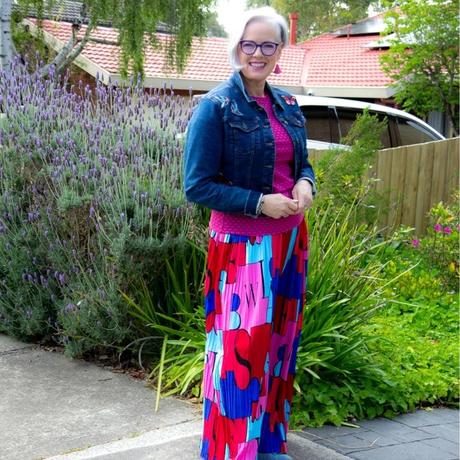
Style Tip: Look for denim with different washes and textures to add variety to your wardrobe. Dark denim offers a more polished look, while distressed or light-wash denim gives off a more casual, relaxed vibe.
Linen: Light and Airy
Linen is the go-to fabric for an effortless, breezy style. Its natural texture, with that slightly crinkled look, adds a sense of ease and relaxed elegance to any outfit. Linen is particularly great for warmer weather because it's breathable and lightweight, but its unique texture also brings a casual chicness that's hard to beat.
The lived-in, slightly rumpled look of linen can be part of its charm, making it ideal for both everyday wear and holiday wardrobes. Linen trousers, shirts, and dresses all have that natural, carefree aesthetic that instantly makes you look like you're strolling through a coastal town-even if you're just running errands.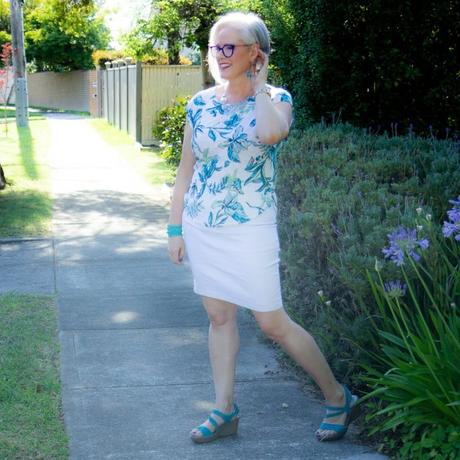
My personal preference for linen is in a knit rather than a woven fabric as it seems to crush less (I hate the crushed look) so I've been stocking up on linen tees in patterns and colours in my colour palette to wear all summer long and stay cool.
Style Tip: Mix linen with heavier fabrics like wool or denim for an interesting contrast. A linen blouse under a wool blazer or a linen dress with a denim jacket creates a mix of textures that feels both relaxed and intentional.
How to Mix Textures Like a Pro
So, how do you bring it all together? Mixing textures can feel intimidating at first, but with a few simple tips, you can create outfits that feel balanced and polished:
- Start Small: If you're new to texture mixing, begin with accessories. A leather belt, a silk scarf, or a chunky wool knit can add texture without overwhelming your look.
- Contrast Heavy and Light: Balance thicker, more structured fabrics like wool or denim with lighter, softer ones like silk or linen. This creates a contrast that's visually interesting and adds depth to your outfit.
- Stick to a Colour Palette: If you're mixing multiple textures, keep your colour palette simple. Sticking to similar tones allows the focus to be on the fabrics themselves, making the textures the star of your outfit.
- Experiment with Layers: Layering is a great way to play with textures. Try a wool coat over a denim shirt or a silk blouse under a chunky knit jumper to create dimension and warmth.
The Final Touch: Texture as Your Secret Weapon
When it comes to fashion, texture is your secret weapon. It's an easy way to make your outfits look more thoughtful, stylish, and rich without needing to rely on bold patterns or accessories. From the luxurious drape of silk to the rugged charm of denim, each fabric brings something unique to the table.
Next time you're putting together an outfit, think about the texture of the fabrics and how they interact with each other. You might be surprised at how much depth and sophistication you can add just by playing with the feel of the fabrics on your skin.
When curating a wardrobe, remember the importance of texture in fashion, as it adds sophistication, depth, and a sense of intentionality. Want to learn more about how to curate a wardrobe that's not just stylish but also rich in texture and depth? Join me in my 7 Steps to Style program, where we explore how to use every element of fashion, from colour to fabric, to tell your personal style story.
 Further Reading
Further Reading
7 Simple Ways to Add Texture to Your Outfits When You Suit Smooth Garments
How to Choose Flattering Texture in Fabrics
Which is the Best for You - Matte, Sheen or Shine?
